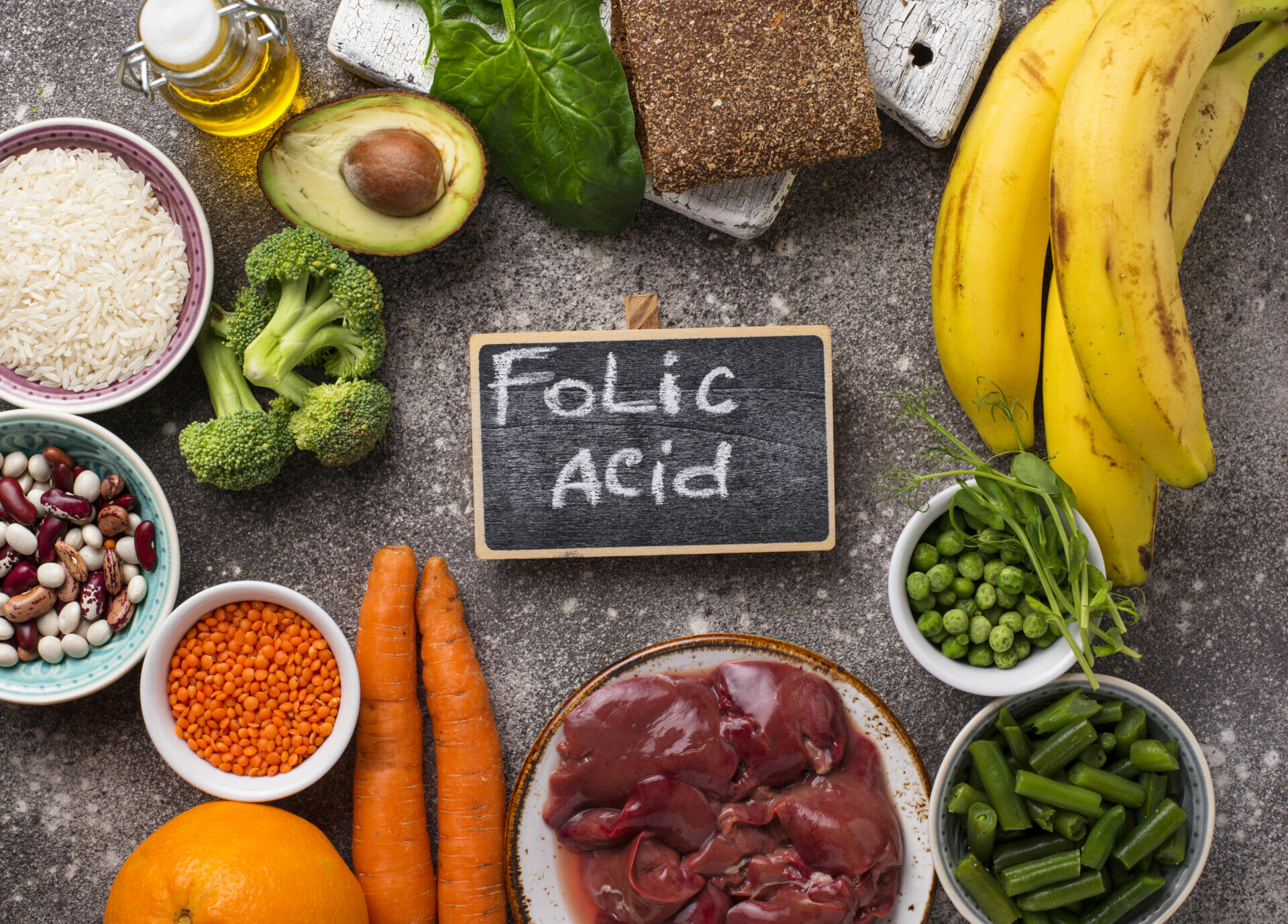What is Folic Acid?
Folate and folic acid are vitamin B9 forms that are used to treat deficiency and prevent pregnancy complications. Many foods contain or have folic acid added to them.
Folic acid has been required by federal law to be added to cold cereals, flour, bread, pasta, bakery items, cookies, and crackers since 1998. Leafy vegetables, okra, asparagus, certain fruits, beans, yeast, mushrooms, animal liver and kidney, orange juice, and tomato juice are naturally high in folate. Folic acid can also be taken as a supplement and is frequently combined with other B vitamins.
Folic acid is used to prevent and treat low folate levels in the blood (folate deficiency) and high homocysteine levels in the blood (hyperhomocysteinemia). Pregnant or planning to become pregnant women should take folic acid to avoid serious congenital disabilities such as spina bifida. Folic acid is also used to treat various other conditions, including depression, stroke, memory and thinking skills decline, and many others.

What’s the difference between folate and folic acid?
Although the terms “folate” and “folic acid” are frequently used interchangeably, they actually refer to different forms of the same vitamin: vitamin B9.
Folic acid differs from folate in structure and has slightly different effects on your body. The term “folate” refers to all forms of vitamin B9, including folic acid and 5-MTHF. Folic acid is a synthetic version of this vitamin.
Folate can be found in a variety of plant and animal foods, including the following:
- spinach
- kale
- broccoli
- avocado
- citrus fruits
- eggs
- beef liver
Foods containing folic acid include flour, ready-to-eat breakfast cereals, and bread.
It’s also found in dietary supplements like multivitamins.
What does the body do with folate?
Your body makes use of folate and Folic Acid to:
- create and repair DNA
- assist cells in growing, dividing, and functioning properly
- create specific proteins
- assist in the maturation of red blood cells
Folate deficiency can cause a variety of health issues, including:
- anemia
- an increased risk of cardiovascular disease and certain cancers
- Infant development problems if pregnant women do not get enough folate
Recommended intake levels
Dietary Folate Equivalents is the Recommended Dietary Allowance (RDA) for folate (DFEs). This unit of measurement takes into account how your body absorbs folate from foods and folic acid from fortified foods and supplements.
Natural folate absorbs about half as well as folic acid from supplements. Adults require 400 mcg DFE of folate per day. Folate requirements can increase during pregnancy and breastfeeding. During pregnancy, the RDA for DFE is 600 mcg.
15–30 mg of folate is stored in your body. The majority of that folate is stored in your liver, with the remainder in your blood and tissues.
The RDA for folate for infants, children, and adolescents is as follows:
- 65 mcg DFE from birth to 6 months
- 80 mcg DFE for children aged 7–12 months
- 150 mcg DFE for children aged 1–3.
- 200 mcg DFE for children aged 4–8
- 300 mcg DFE for ages 9–13
- 400 mcg DFE for ages 14–18

Benefits and uses
Supplements contain both folic acid and folate. Despite the fact that these two nutrients treat the same conditions, they are metabolized differently in the body and can have different effects on health.
Here are some of the most common uses and advantages of folic acid supplements.
Treating a lack of folate
Folate deficiency can occur for a variety of reasons. Some of the possible causes of folate deficiency include:
- A deficiency of folate in your diet
- Celiac disease, short bowel syndrome, and gastric bypass surgery are all examples of diseases or surgeries that affect how your body absorbs folate.
- Stomach acid deficiency (achlorhydria) or low stomach acid (hypochlorhydria)
- Methotrexate and sulfasalazine are two drugs that affect folate absorption (Azulfidine)
- A drinking problem
- Pregnancy
- Anemia caused by hemolysis
- Dialysis
Anemia, fetal development issues, mental impairment, impaired immune function, and depression can all result from consuming insufficient folate. Taking folic acid or folate supplements can help you increase your levels and avoid these complications.
Preventing birth defects and complications during pregnancy
Folic acid supplements can help prevent neural tube defects such as spina bifida and anencephaly. Getting enough folic acid during pregnancy can lower your baby’s chances of being born with one of these conditions.
Folic acid supplements not only help prevent fatal development problems, but they also help reduce the risk of pregnancy complications like preeclampsia.
Maintaining brain health
Low folate levels in the blood have been linked to poor mental function and an increased risk of dementia. Even technically normal but low folate levels may increase the risk of mental impairment in older adults.
Adequate folate consumption may also help prevent Alzheimer’s disease. Taking 400 mcg of folic acid supplements daily for two years improved measures of brain function and reduced blood levels of proteins involved in Alzheimer’s disease in a 2019 study of 180 adults with mild cognitive impairment.
Another study included 121 people with newly diagnosed Alzheimer’s disease who were receiving donepezil treatment (Aricept). Those who also took 1,250 mcg of folic acid per day for 6 months had better cognition and less inflammation than those who only took Aricept.
Treating mental health conditions
Folate is involved in the synthesis of brain chemicals known as neurotransmitters. A lack of folate has been linked to depression, schizophrenia, and other mental health issues. People with depression, for example, may have lower blood levels of folate than people who are not depressed.
According to a 2022 study review, folic acid and folate supplements may help reduce symptoms of mental health conditions like postpartum depression, schizophrenia, and bipolar disorder. Taking folate supplements alongside antidepressant medication may reduce depression symptoms more effectively than antidepressant medication alone.
A meta-analysis of seven studies found that treating people with schizophrenia with folate supplements in addition to antipsychotic medication may improve symptoms more than antipsychotic medication alone.
Reducing heart disease risk factors
Folate-based supplements, such as folic acid, may benefit heart health and lower the risk of heart disease.
High levels of the amino acid homocysteine are thought to raise the risk of heart disease. Because folate aids in the breakdown of homocysteine, a lack of folate can result in elevated homocysteine levels, also known as hyperhomocysteinemia.
Folic acid supplements can help lower homocysteine levels and may reduce the risk of heart disease. For example, a review of 30 studies with over 80,000 total participants found that taking folic acid supplements reduced overall heart disease risk by 4% and stroke risk by 10%.
Furthermore, taking folic acid supplements in addition to antihypertensive medications may reduce high blood pressure significantly more than taking antihypertensive medications alone. Supplementing with folic acid may also improve blood vessel function in people with heart disease.
Other possible benefits
Folic acid supplements may also help with the following health issues.
- Diabetes
Folate supplements may help diabetics improve blood sugar regulation and reduce insulin resistance. Because the diabetes medication metformin can lower folate levels, you may need to take a supplement if yours are low.
2. Fertility problems
Folate can help eggs grow and implant in the uterus by improving egg quality. Taking folate may improve your chances of becoming pregnant and carrying a child to term. People who use assisted reproductive technology to conceive may have a higher chance of having a baby if they consume more supplemental folate.
3. Inflammation
Many diseases are caused by inflammation. Folic acid and folate supplements have been shown to lower inflammation markers such as C-reactive protein.
4. Kidney failure
The kidneys normally filter waste from the blood, but when they are damaged, homocysteine can accumulate. Homocysteine levels in the blood are elevated in approximately 85 percent of people with chronic kidney disease. In people with kidney disease, folic acid supplements may help reduce homocysteine levels and the risk of heart disease.
